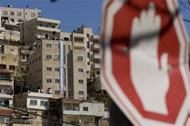On February 5, Hamas officially apologized for the death of Israeli civilians during Israel's Cast Lead invasion on the Gaza Strip last winter. "We regret any harm that may have befallen any Israeli civilian. We hope the Israeli civilians understand that their government's continued attacks on us were the key issue and the cause," read a report issued by a committee set up by Islamic movement to examine war crimes by its members. The report first listed Israel's violations against Palestinians before saying the homemade rockets were fired in self-defense and aimed at Israeli military targets. The reason they struck civilians, Hamas says, was purely out of lack of accuracy.
"It should be noted that the Palestinian resistance...is not an organized army that possesses developed technological weapons," the report said. "It may target a military site or a tank position and their fire goes astray...and hit a civilian location, despite their efforts to avoid hurting civilians." Three Israeli civilians were killed by rocket fire during the 22-day invasion.
In contrast, Israel's report continued to defend its government and army's position in Cast Lead. Israel's foreign ministry defended its own report by saying that it, "completely expresses Israel's commitment to conduct an honest internal probe according to the standards of international law." "Despite the difficult conditions of fighting against Hamas terror, Israel has stringently abided by international norms and will continue to do in the future - though our foremost obligation is to protect our citizens."
Israel's only admittance of wrongdoing was stating on February 1 that white phosphorous shells had been shot at a UN facility, which had jeopardized Palestinian lives. Two by two senior military officers will supposedly be "disciplined" according to the report.
Although UN Chief Ban Ki-Moon acknowledged receipt of the two Israeli and Palestinian responses to UN allegations of war crimes on February 3, he added that, "No determination can be made on the implementation of the resolution [concerning war crimes] by the parties concerned."
As a result, Palestine's UN Ambassador, Riyad Mansour said on February 5 that the Palestinians want the International Criminal Court of Justice to play its role in adjudicating alleged war crimes, adding that the Security Council has not fulfilled its responsibility in requesting that the ICC carry out its own investigation.
Gaza was also the scene of the first real shot at Hamas-Fateh reconciliation in a long time. On February 3, Fateh Central Committee member Nabil Shaath and long time PLO veteran travelled via the Erez crossing into the Gaza Strip. Shaath, a Gaza native, met with Hamas leader Ismail Haniyeh and other high ranking Hamas officials in a serious bid to smooth out the two parties' differences. Shaath also met with other representatives of Palestinian factions during his two-day stay in the Strip.
Hamas says it is still investigating the assassination of one of its top men, Mahmoud Al Mabhouh last month in Dubai. While Dubai has told Hamas it would not allow it to take part in its investigation, Dubai's police chief said on February 4 that Dubai authorities would issue an arrest warrant for Israeli Prime Minister Benjamin Netanyahu if it were revealed that Israeli intelligence had a hand in the killing.
Meanwhile, Prime Minister Salam Fayyad has taken some criticism from Palestinians for attending the Herzilya Conference on February 2 on Israel's security among other topics. Senior Fateh official, Hatem Abdel Qader said his political party was "furious" at Fayyad's attendance. Hamas also slammed Fayyad for attending.
During his speech, Fayyad, who took the podium after Israeli Defense Minister Salam Fayyad, stressed that "the state being built here is Palestinian, and who should build it rather than us? A peace process is needed, because this will lead to the end of the occupation."
Fayyad said the Palestinians were ready for their state to be established by 2011. "Security is also a Palestinian interest, not just an Israeli one," the prime minister said. "It's time to stop the [Israeli army] raids. The Palestinians can have an official security presence outside Area A as well."
Most would agree that 2011 is an ambitious goal if the facts on the ground are to be considered, namely Jewish settlements on the land slated for the future Palestinian state. On February 4, settlers took over a mountainside south of Nablus, which has an area of around 500 dunams. The land, which belongs to Palestinians from the Jaloud village, now has four mobile homes parked on it, courtesy of the settlers.
On February 31, Israeli Minister without Portfolio Beni Begin laid the cornerstone of 10 new homes in the Bet Hagai settlement south of Hebron. "My presence here means that we will continue to build in “Eretz Israel” (including the West Bank) he said, adding that this construction was not in contradiction to the 10-month moratorium on settlement construction. The new plan, he claims, was licensed more than three months ago.
Finally, on February 4, the Israeli Jerusalem municipality announced it would close down a settler building in Silwan, taken over by extremist settlers in 2004. The order, under Jerusalem mayor Nir Barkat, also includes the demolition of some 200 Palestinian homes in Silwan.








